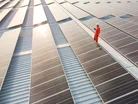RICS Spotlights Solar Energy use for Commercial Properties

Renowned global surveying company, RICS, has offered wisdom to the construction industry once again, this time stressing the importance of solar energy to benefit company assets, and sustainability goals.
Sustainability is emerging as a pivotal force worldwide that is driving the integration of data and technology in both built and natural environments.
With global challenges such as rising costs, escalating regulatory pressures and evolving tenant expectations, commercial building owners and developers are increasingly prioritising sustainable practices to future-proof their investments.
And a standout solution in these challenges, is the incorporation of renewable energy solutions, particularly rooftop solar panels.
Rooftop solar panels not only align with sustainability objectives, but unlike many other strategies, can unlock significant revenue streams from existing assets while reducing tenants' energy costs.
Several major construction companies are already leading the way in using solar energy for commercial properties, including: Skanska, Turner Construction, Clark Construction, Mortenson and Balfour Beatty.
So we take a look at what benefits RICS proposes solar energy can offer for the future of commercial housing worldwide.
Up-sizing solar energy can future-proof company assets
Rooftop solar installations provide energy independence and protection for building owners in the face of volatile energy markets and price hikes, boosting energy efficiency ratings for the buildings, and thus making them more appealing to sustainability-conscious tenants.
For commercial building owners looking to enhance the long-term value of their assets, rooftop solar panels offer compelling future-proofing opportunities.
- Revenue Generation
- Cost Savings
- Energy Independence
- Sustainability Credentials
- Increased Property Value
- Regulatory Compliance and Incentives
- Improved Energy Efficiency Ratings
Installing solar panels means commercial building owners can sell excess energy back to the grid, creating a consistent and long-term revenue stream.
And because this energy source is also cheaper and renewable, energy efficiency ratings will improve, leading properties to quickly become more attractive, potentially leading to higher occupancy rates and competitiveness in the market.
Additionally, many regions offer incentives, tax breaks, and grants for renewable energy projects, so taking advantage of these can reduce the initial investment cost and improve the overall financial feasibility of solar projects.
By leveraging these benefits, commercial building owners can significantly enhance the long-term value and appeal of their assets.
The benefits of up-sizing to modernise solar energy use
Traditional advice from solar consultants suggests sizing solar installations to meet the current needs of tenants, sometimes including a battery to minimise costs and limit low grid export tariffs.
However, this method often creates issues, as the required on-site tariff for profitability is often too high for tenants, and it doesn’t allow for future growth, like adding EV charging stations, or provide revenue stability if the building is vacant.
A new approach, called up-sizing, addresses these problems by installing more solar capacity than currently needed and selling the excess energy.
This strategy aligns incentives between building owners and tenants, increases revenue, and improves on-site tariffs.
Additionally, it generates extra energy, which future-proofs the property for expansion and potential tenant needs.
How export tariffs for solar energy can help ensure revenue stability
However, for up-sized solar projects to be profitable, simply selling excess energy to the grid at low, volatile rates isn’t enough.
Commercial building owners need a guaranteed, fixed, long-term export tariff to ensure revenue stability, even amid market volatility or tenant vacancies.
This certainty allows owners to offer tenants competitive rates, saving them money and strengthening relationships.
Fixed tariffs can be secured by selling to a network of reliable energy buyers, not just the grid.
These buyers might include other tenants with insufficient solar capacity, buildings unsuitable for solar, or large consumers like data centres.
So this network helps balance energy supply and demand across the owner’s entire real estate portfolio, enhancing project financials and future-proofing investments.
Unused commercial roof space offers significant revenue potential
If commercial building owners adopt a modern approach to solar planning, they will find that there are many unused commercial roof spaces that can supply significant revenue potential.
Bearing this in mind, alongside securing a guaranteed, fixed, long-term export tariff from a network of energy buyers, assets can not only be future-proofed but energy costs can be vastly improved.
And on the ground, this strategy can gain certainty in the face of tenant voids, strengthen the tenant/owner relationships, and provide revenue stability during tenant vacancies.
Paul Weale, Project Director for Skanska, says sustainability goals like striving for net-zero carbon emissions on projects by 2045, including its supply chain: “is a core part of our whole approach to construction” and continues that their initiative to install solar panels “demonstrates how being environmentally conscious and cost conscious can be entirely aligned.”
******
Make sure you check out the latest news at Construction Digital, a BizClik brand.




